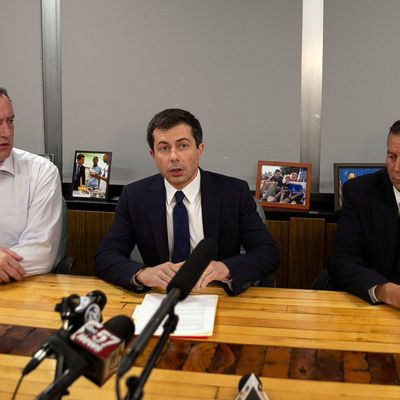
Pete Buttigieg has done remarkably well so far in his long-shot 2020 presidential campaign, all things considered. But he has a couple of very basic problems. One is that for all his charisma and brains, he’s still a 30-something mayor of a small city, and unless you think Donald Trump has repealed all minimum qualifications for the presidency for all eternity, that’s going to bother some voters. A second problem is that he’s a classic “wine-track” candidate whose appeal is mostly to college-educated white folks. He’s gained little support, in particular, among African-American voters who will play a crucial role in the nominating process once Iowa and New Hampshire have come and gone.
So it’s a dual problem for him that right when things on the campaign trail are getting real, a racially tinged police shooting has occurred in his city, as NBC News reported:
Just after 3 a.m. Sunday, South Bend police responded to a suspicious person they later said was believed to be going through cars at an apartment complex, NBC affiliate WDNU reported. When an officer engaged with the suspect, 53-year-old Eric Jack Logan, Logan allegedly approached the officer with a knife. The officer then fired at Logan, who was taken to a hospital and soon after pronounced dead. The officer was treated for minor injuries.
Logan is African-American. The police officer, Ryan O’Neill, is white, and did not have his body camera switched on, as the South Bend Tribune reports after an initial investigation by police and local prosecutors:
They explained that the lights, dashboard camera and body camera are all connected; because O’Neill had not activated his lights, neither his dashcam video nor his body camera went on.
O’Neill did not have his lights on because he was circling the parking lot and searching the area just as he came upon Logan inside a car, according to Cotter. The officer also did not turn on his body camera through an activation button on his wrist because O’Neill initially was checking the identity of the person in the car to determine if he was the owner, Cotter said.
Logan’s relatives want answers they may never be able to get:
Logan’s family members have questioned the police version of events, saying Logan had no history of theft and would not have tried to attack an armed officer with a knife. They have also questioned why he was taken to the hospital in a police cruiser instead of an ambulance.
At a vigil Monday night for Logan attended by about 150 people, Common Council members and religious leaders expressed concerns about the lack of body camera footage of the incident.
Logan spent several years in prison for dealing cocaine, and was also once convicted of carrying a handgun without a license. But as his family notes, his criminal record shows no charges of theft — and, of course, he’s not alive to tell his side of the story.
Buttigieg has little choice but to let the investigation proceed while listening to all sides. But he understands the potentially critical nature of this incident, and left the campaign trail immediately to attend to it, as the New York Times reported:
Pete Buttigieg pulled himself off the presidential campaign trail on Monday and returned to his day job as mayor of South Bend, Ind., after a police officer there shot and killed a black man.
“I know that whenever an incident like this happens, there is tremendous hurt that can come about,” Mr. Buttigieg said at a news conference on Sunday night.
Like many cities, South Bend has a history of police-minority tensions, City Lab recently observed:
Several cases alleging racial discrimination within the local police department under Buttigieg are still moving forward. In South Bend, law enforcement is disproportionately white. The city’s population is 26 percent African American and 14 percent Hispanic, but the police force is only 5 percent black and 5 percent Hispanic. Records show that minorities have left the force by the dozens.
Buttigieg has already gotten some scrutiny for his role in the 2012 demotion of the city’s first African-American police chief, Darryl Boykins, after the chief (perhaps illegally) taped conversations of officers allegedly making racist remarks. That case has tied up the city in years of expensive litigation. Mayor Pete is also trying to overcome criticism of a 2015 speech in which he used the phrase “all lives matter” in the context of police-community relations. He recently apologized for his remarks, saying he didn’t understand its connotations at the time.
All in all, the situation is a bit of a powder keg, and while it could showcase Buttigieg’s skills as a mediator, it could also force him to say and do things that will displease everyone, as the Washington Post’s Eugene Scott observes:
One of the reasons Buttigieg has arguably experienced the success he has is his ability to present himself as a centrist who sees both sides of issues and therefore could work toward finding common ground. However, the issue of police brutality against black people has proved a deeply polarizing one, and it could test that ability at a critical moment for his campaign.
I’m sure Mayor Pete would rather be engaged in fundraising, organizing (which he badly needs in the early states), and debate prep (he will be on the second-night, June 27, debate panel along with Joe Biden, Bernie Sanders, and Kamala Harris) instead of being engaged in crisis management in an environment full of grief, fear, and anger. But even if being a small-city mayor doesn’t impress everybody, this sort of conundrum often comes with the job.






























